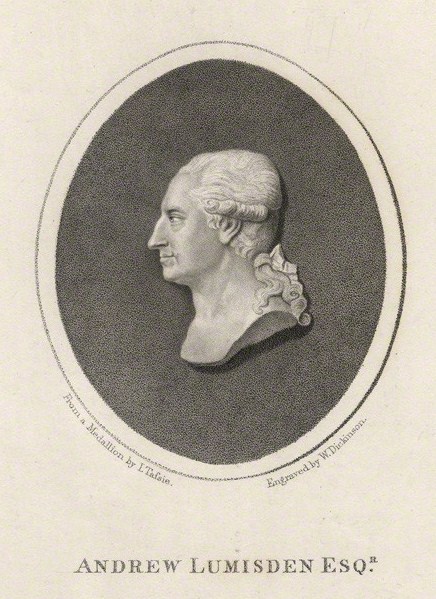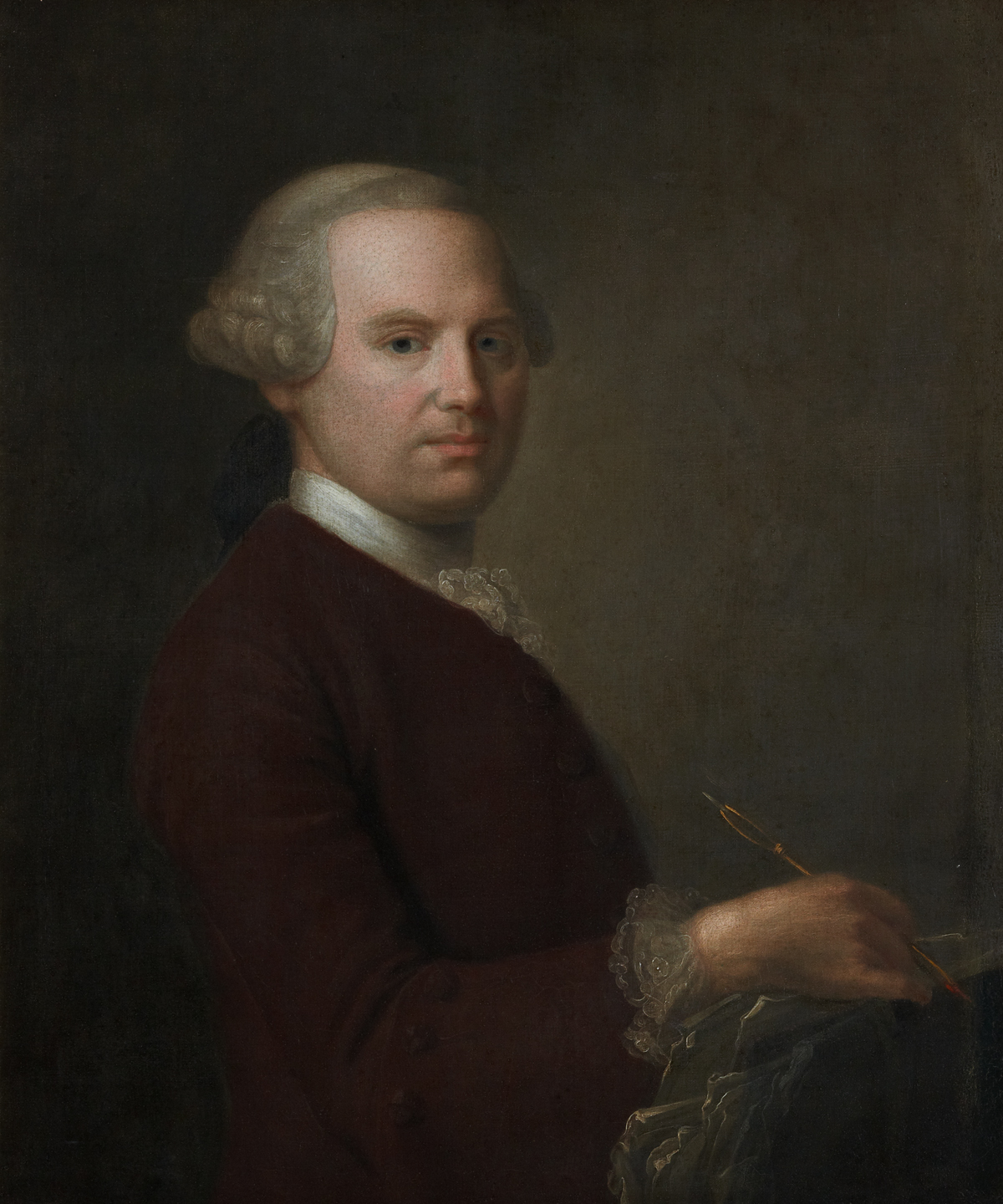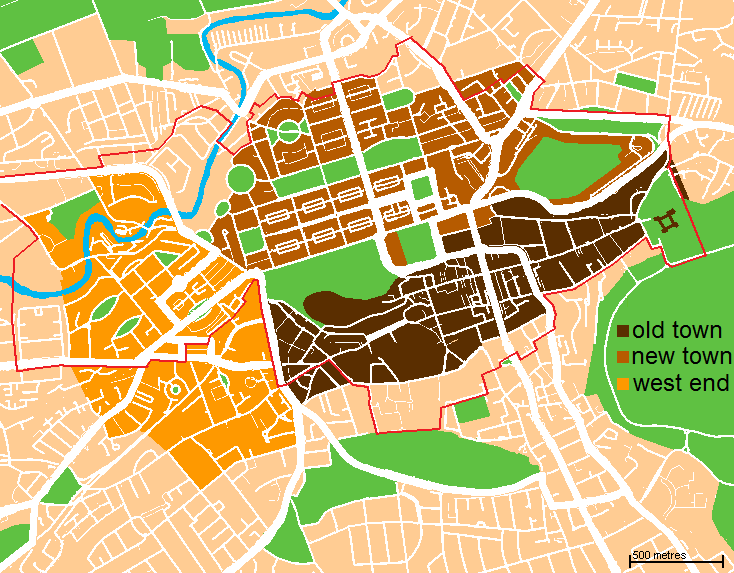|
Andrew Lumisden
Andrew Lumisden, Lumsden or Lumiden FRSE FSA (1720–25 December 1801) was a Scottish Jacobite. He was Personal Secretary to Bonnie Prince Charlie during his exile in Rome. He was a joint founder of the Royal Society of Edinburgh in 1783. Early life He was the only son of William Lumisden, a law agent in Edinburgh, and his wife, Mary Bruce, daughter of Robert Bruce, an Edinburgh merchant. He was educated at the High School in Edinburgh then studied law at the University of Edinburgh, which he followed until the Jacobite Rebellion of 1745. The '45 On the recommendation of Dr Alexander Cunningham, a younger son of Sir William Cunningham of Caprington, Ayrshire, Lumisden became private secretary to Charles Edward Stuart shortly after his arrival in Edinburgh. He accompanied the prince throughout the campaign, and was present at the battle of Culloden. On the eve of the battle the prince's aide-de-camp wrote to Ewen MacPherson of Cluny, asking him to take particular care of Lumisd ... [...More Info...] [...Related Items...] OR: [Wikipedia] [Google] [Baidu] |
FRSE
Fellowship of the Royal Society of Edinburgh (FRSE) is an award granted to individuals that the Royal Society of Edinburgh, Scotland's national academy of science and letters, judged to be "eminently distinguished in their subject". This society received a royal charter in 1783, allowing for its expansion. Elections Around 50 new fellows are elected each year in March. there are around 1,650 Fellows, including 71 Honorary Fellows and 76 Corresponding Fellows. Fellows are entitled to use the post-nominal letters FRSE, Honorary Fellows HonFRSE, and Corresponding Fellows CorrFRSE. Disciplines The Fellowship is split into four broad sectors, covering the full range of physical and life sciences, arts, humanities, social sciences, education, professions, industry, business and public life. A: Life Sciences * A1: Biomedical and Cognitive Sciences * A2: Clinical Sciences * A3: Organismal and Environmental Biology * A4: Cell and Molecular Biology B: Physical, Engineering and ... [...More Info...] [...Related Items...] OR: [Wikipedia] [Google] [Baidu] |
Rouen
Rouen (, ; or ) is a city on the River Seine in northern France. It is the prefecture of the Regions of France, region of Normandy (administrative region), Normandy and the Departments of France, department of Seine-Maritime. Formerly one of the largest and most prosperous cities of Middle Ages, medieval Europe, the population of the metropolitan area (french: functional area (France), aire d'attraction) is 702,945 (2018). People from Rouen are known as ''Rouennais''. Rouen was the seat of the Exchequer of Normandy during the Middle Ages. It was one of the capitals of the Anglo-Normans, Anglo-Norman dynasties, which ruled both England and large parts of modern France from the 11th to the 15th centuries. From the 13th century onwards, the city experienced a remarkable economic boom, thanks in particular to the development of textile factories and river trade. Claimed by both the French and the English during the Hundred Years' War, it was on its soil that Joan of Arc was tried ... [...More Info...] [...Related Items...] OR: [Wikipedia] [Google] [Baidu] |
Jacobite Secretaries Of State
Jacobite means follower of Jacob or James. Jacobite may refer to: Religion * Jacobites, followers of Saint Jacob Baradaeus (died 578). Churches in the Jacobite tradition and sometimes called Jacobite include: ** Syriac Orthodox Church, sometimes colloquially known as the Jacobite Church ** Jacobite Syrian Christian Church, autonomous branch of the Syriac Orthodox Church in Kerala, India ** Malankara Orthodox Syrian Church, an autocephalous Jacobite church based in Kerala, India * Jacobite, follower of Henry Jacob (1563–1624), English clergyman * Jacobites, Biblical name for descendants of Jacob Politics * Jacobites, followers of Jacobitism, political movement to resurrect the Stuart kingship, 1688–1780s * Jacobite risings, series of rebellions in Great Britain and Ireland, 1688–1746 * Jacobite succession, the line through which the British ''crown in pretence'' has descended since 1688 * Jacobite consorts, those who were married to Jacobite pretenders since 1688 * Jacobite ... [...More Info...] [...Related Items...] OR: [Wikipedia] [Google] [Baidu] |
Fellows Of The Royal Society Of Edinburgh
The Royal Society of Edinburgh is Scotland's national academy of science and letters. It is a registered charity that operates on a wholly independent and non-partisan basis and provides public benefit throughout Scotland. It was established in 1783. , there are around 1,800 Fellows. The Society covers a broader selection of fields than the Royal Society of London, including literature and history. Fellowship includes people from a wide range of disciplines – science & technology, arts, humanities, medicine, social science, business, and public service. History At the start of the 18th century, Edinburgh's intellectual climate fostered many clubs and societies (see Scottish Enlightenment). Though there were several that treated the arts, sciences and medicine, the most prestigious was the Society for the Improvement of Medical Knowledge, commonly referred to as the Medical Society of Edinburgh, co-founded by the mathematician Colin Maclaurin in 1731. Maclaurin was unhappy ... [...More Info...] [...Related Items...] OR: [Wikipedia] [Google] [Baidu] |
People From Edinburgh
A person ( : people) is a being that has certain capacities or attributes such as reason, morality, consciousness or self-consciousness, and being a part of a culturally established form of social relations such as kinship, ownership of property, or legal responsibility. The defining features of personhood and, consequently, what makes a person count as a person, differ widely among cultures and contexts. In addition to the question of personhood, of what makes a being count as a person to begin with, there are further questions about personal identity and self: both about what makes any particular person that particular person instead of another, and about what makes a person at one time the same person as they were or will be at another time despite any intervening changes. The plural form "people" is often used to refer to an entire nation or ethnic group (as in "a people"), and this was the original meaning of the word; it subsequently acquired its use as a plural form of ... [...More Info...] [...Related Items...] OR: [Wikipedia] [Google] [Baidu] |
Scottish Antiquarians
Scottish usually refers to something of, from, or related to Scotland, including: *Scottish Gaelic, a Celtic Goidelic language of the Indo-European language family native to Scotland *Scottish English *Scottish national identity, the Scottish identity and common culture *Scottish people, a nation and ethnic group native to Scotland *Scots language, a West Germanic language spoken in lowland Scotland *Symphony No. 3 (Mendelssohn), a symphony by Felix Mendelssohn known as ''the Scottish'' See also *Scotch (other) *Scotland (other) *Scots (other) *Scottian (other) *Schottische The schottische is a partnered country dance that apparently originated in Bohemia. It was popular in Victorian era ballrooms as a part of the Bohemian folk-dance craze and left its traces in folk music of countries such as Argentina ("chotis"Span ... * {{disambiguation Language and nationality disambiguation pages ca:Escocès ... [...More Info...] [...Related Items...] OR: [Wikipedia] [Google] [Baidu] |
Scottish Jacobites
Scottish usually refers to something of, from, or related to Scotland, including: *Scottish Gaelic, a Celtic Goidelic language of the Indo-European language family native to Scotland *Scottish English *Scottish national identity, the Scottish identity and common culture *Scottish people, a nation and ethnic group native to Scotland *Scots language, a West Germanic language spoken in lowland Scotland *Symphony No. 3 (Mendelssohn), a symphony by Felix Mendelssohn known as ''the Scottish'' See also *Scotch (other) *Scotland (other) *Scots (other) *Scottian (other) *Schottische * {{disambiguation Scottish people, Language and nationality disambiguation pages ca:Escocès ... [...More Info...] [...Related Items...] OR: [Wikipedia] [Google] [Baidu] |
1801 Deaths
Eighteen or 18 may refer to: * 18 (number), the natural number following 17 and preceding 19 * one of the years 18 BC, AD 18, 1918, 2018 Film, television and entertainment * ''18'' (film), a 1993 Taiwanese experimental film based on the short story ''God's Dice'' * ''Eighteen'' (film), a 2005 Canadian dramatic feature film * 18 (British Board of Film Classification), a film rating in the United Kingdom, also used in Ireland by the Irish Film Classification Office * 18 (''Dragon Ball''), a character in the ''Dragon Ball'' franchise * "Eighteen", a 2006 episode of the animated television series ''12 oz. Mouse'' Music Albums * ''18'' (Moby album), 2002 * ''18'' (Nana Kitade album), 2005 * '' 18...'', 2009 debut album by G.E.M. Songs * "18" (5 Seconds of Summer song), from their 2014 eponymous debut album * "18" (One Direction song), from their 2014 studio album ''Four'' * "18", by Anarbor from their 2013 studio album '' Burnout'' * "I'm Eighteen", by Alice Cooper commonly ... [...More Info...] [...Related Items...] OR: [Wikipedia] [Google] [Baidu] |
1720 Births
Seventeen or 17 may refer to: *17 (number), the natural number following 16 and preceding 18 * one of the years 17 BC, AD 17, 1917, 2017 Literature Magazines * ''Seventeen'' (American magazine), an American magazine * ''Seventeen'' (Japanese magazine), a Japanese magazine Novels * ''Seventeen'' (Tarkington novel), a 1916 novel by Booth Tarkington *''Seventeen'' (''Sebuntiin''), a 1961 novel by Kenzaburō Ōe * ''Seventeen'' (Serafin novel), a 2004 novel by Shan Serafin Stage and screen Film * ''Seventeen'' (1916 film), an American silent comedy film *''Number Seventeen'', a 1932 film directed by Alfred Hitchcock * ''Seventeen'' (1940 film), an American comedy film *''Eric Soya's '17''' (Danish: ''Sytten''), a 1965 Danish comedy film * ''Seventeen'' (1985 film), a documentary film * ''17 Again'' (film), a 2009 film whose working title was ''17'' * ''Seventeen'' (2019 film), a Spanish drama film Television * ''Seventeen'' (TV drama), a 1994 UK dramatic short starring Christ ... [...More Info...] [...Related Items...] OR: [Wikipedia] [Google] [Baidu] |
Sir Robert Strange
Sir Robert Strange (14 July 1721 – 5 July 1792) was a Scottish engraver. A Jacobite, he spent periods out of Great Britain, but was eventually reconciled to the Hanoverian succession and was knighted by George III. Early life The eldest son of David Strang of Kirkwall in Orkney, by his second wife Jean, daughter of Malcolm Scollay of Hunton, he was born at Kirkwall on 14 July 1721. He entered the office of a brother, a lawyer in Edinburgh. He then was apprenticed to Richard Cooper, the elder, an engraver, for six years. Strange fought in the rising of 1745. While with the army at Inverness, he engraved a plate for the bank-notes of the planned Stuart government. He was at the battles of Prestonpans and Falkirk Muir in the Young Pretender's lifeguards; and was in hiding for some months after the Battle of Culloden. Voluntary exile After the amnesty Strange went to London and, carrying with him the Prince's seal, which had been left behind in Scotland, to Rouen, a centre o ... [...More Info...] [...Related Items...] OR: [Wikipedia] [Google] [Baidu] |
James Maidment
James Maidment (1793 in London – 1879 in Edinburgh) was a British antiquary and collector. He passed through Edinburgh University to the Scottish bar, and was chief authority on genealogical cases. Maidment's hobby was the collection of literary rarities. He edited and published editions of ancient literary remains including ''A Book of Scottish Pasquils, 1568-1715'', a selection from the papers of the family of Boyd of Kilmarnock from the 16th and 17th centuries, state papers and miscellaneous correspondence of Thomas, Baron Melros (from the 17th century), letters and state papers during the reign of King James the Sixth, chiefly from the manuscript collections of Sir James Balfour of Denmylne, constitutions, charters etc. of the nunnery of Sciennes, 1512–88, and ''Scottish Ballads and Songs: Historical and Traditionary''. Maidment was also a poet and a friend of Sir Walter Scott. A collection of his poems is held at the Kenneth Spencer Research Library at the Univer ... [...More Info...] [...Related Items...] OR: [Wikipedia] [Google] [Baidu] |
New Town, Edinburgh
The New Town is a central area of Edinburgh, the capital of Scotland. It was built in stages between 1767 and around 1850, and retains much of its original neo-classical and Georgian period architecture. Its best known street is Princes Street, facing Edinburgh Castle and the Old Town across the geological depression of the former Nor Loch. Together with the West End, the New Town was designated a UNESCO World Heritage Site alongside the Old Town in 1995. The area is also famed for the New Town Gardens, a heritage designation since March 2001. Proposal and planning The idea of a New Town was first suggested in the late 17th century when the Duke of Albany and York (later King James VII and II), when resident Royal Commissioner at Holyrood Palace, encouraged the idea of having an extended regality to the north of the city and a North Bridge. He gave the city a grant:That, when they should have occasion to enlarge their city by purchasing ground without the town, or to build ... [...More Info...] [...Related Items...] OR: [Wikipedia] [Google] [Baidu] |


_1938.jpg)

